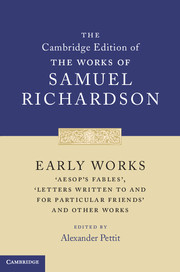Book contents
- Frontmatter
- Dedication
- Contents
- General Editors’ Preface
- Acknowledgements
- Chronology
- List of Abbreviations
- General Introduction
- Textual Introduction
- The Apprentice’s Vade Mecum (1733)
- A Seasonable Examination of the Pleas and Pretensions (1735)
- Preface to Aubin, A Collection of Entertaining Histories and Novels (1739)
- Aesop’s Fables (1739)
- Letters Written to and for Particular Friends (1741)
- Six Original Letters Upon Duelling (1765)
- Appendix: The Infidel Convicted (1731)
- Postscript
- Emendations
- Word-division
- Bibliographical Descriptions of Early Editions
- Explanatory Notes
- Index
Letter CXLVI
Published online by Cambridge University Press: 30 June 2022
- Frontmatter
- Dedication
- Contents
- General Editors’ Preface
- Acknowledgements
- Chronology
- List of Abbreviations
- General Introduction
- Textual Introduction
- The Apprentice’s Vade Mecum (1733)
- A Seasonable Examination of the Pleas and Pretensions (1735)
- Preface to Aubin, A Collection of Entertaining Histories and Novels (1739)
- Aesop’s Fables (1739)
- Letters Written to and for Particular Friends (1741)
- Six Original Letters Upon Duelling (1765)
- Appendix: The Infidel Convicted (1731)
- Postscript
- Emendations
- Word-division
- Bibliographical Descriptions of Early Editions
- Explanatory Notes
- Index
Summary
From a Mother to her high-spirited Daughter, who lives on uneasy Terms with her Husband.
Dear Nanny,
I am sorry with all my Heart, to hear of the frequent Misunderstandings between your Husband and you. I hoped much better things from your Prudence. From my Prudence, you’ll say perhaps! as if I thought all the Fault was yours: But, my Dear, I don't think so, I can't think so; and yet I may find Fault with your want of Prudence too: For Prudence will oblige a good Wife to bear a little Contradiction from her Husband, tho’ not always just, perhaps, as well as to avoid giving Offence. Suppose he is peevish, petulant, uneasy in his Temper, and on slight or no Occasions, as you may think; must you be peevish and petulant, because he is so? How do you know what things may have happened to him abroad, in the way of his Business, to make him so?—Or, if it be only Humour, why must you be as bad as he that you find Fault with? Is an ill Temper in a Husband, so taking a thing, that the Wife, who finds it intolerable to her, must nevertheless imitate or assume it?
The Reason why you will not allow him to be oftener in the Right, and why you condemn as causeless his Petulance and Waspishness, must proceed in a great measure from a slender Opinion, if not Contempt, of his Judgment. If you think him a Man of Sense, ‘tis impossible but you should allow, that there may be some Cause, tho’ you don't immediately penetrate it, why he should be disturbed; and it would be kind in you to suppose the best; as, that his Tenderness for you will not let him communicate it to you, rather than to imagine he is always in the wrong, and always angry without Reason. But were it actually to be so, are you commissioned to punish him with Provocations and Resentments as wrong, and even more unbecoming in a Wife? If you love him as you ought, you will extenuate his Failings, and draw into an advantageous Light those Actions which may be interpreted in his Favour.
- Type
- Chapter
- Information
- Early Works'Aesop's Fables', 'Letters Written to and for Particular Friends' and Other Works, pp. 477 - 480Publisher: Cambridge University PressPrint publication year: 2011

